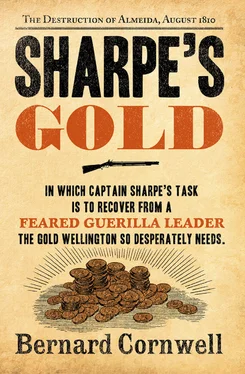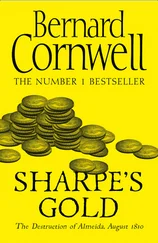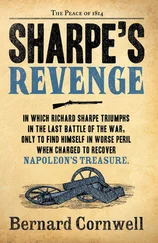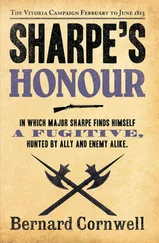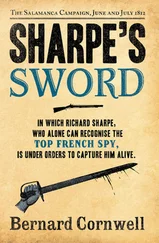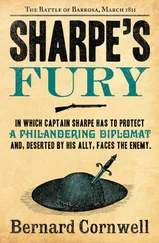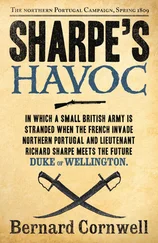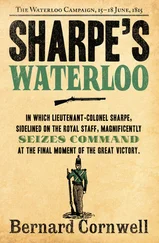The depressing thought made him stare at the hermitage, half hidden by trees, the unlikely place where Wellington’s hopes were pinned. Without Kearsey it was even more important that the Company should try to find the gold that night, but then those hopes, too, were dashed. Half the lancers rode with their prisoner to the village, but the other half, in a curving column, trotted towards the graveyard and its hermitage. Sharpe cursed beneath his breath. There was no hope now of finding the gold that night. The only chance left was to wait until the French had gone, till they had stopped using the village and the hermitage as their base for the campaign against the Partisans in the hills. And when the French did go, El Católico would come, and Sharpe had no doubt that the tall, grey-cloaked Spaniard would use every effort to stop the British from taking the gold. Only one man stood a chance of persuading the Partisan leader, and that man was a prisoner, wounded, in the hands of the lancers. He slid back from the skyline, turned and stared at the Company.
Harper slid down beside him. ‘What do we do, sir?’
‘Do? We fight.’ Sharpe gripped the hilt of the sword. ‘We’ve been spectators long enough. We get the Major out, tonight.’
Knowles heard him, turned an astonished face on them. ‘Get him out, sir? There’s two regiments there!’
‘So? That’s only eight hundred men. There are fifty-three of us.’
‘And a dozen Irish.’ Harper grinned at the Lieutenant.
Knowles scrambled down the slope, looking at them with a disbelieving stare. ‘With respect, sir. You’re mad.’ He began to laugh. ‘Are you serious?’
Sharpe nodded. There was no other choice. Fifty-three men must take on eight hundred, or else the war was lost. He grinned at Knowles. ‘Stop worrying! It’ll be simple!’
And how the hell, he thought, do we do it?
Sharpe mocked himself. So simple. Just release the Major when two of the finest regiments in the French army were expecting a night attack. The wise course, he thought, was to go home. The French probably had the gold by now, the war was lost, and a sensible man would shoulder his rifle and think about making a living at home. Instead, like a gambler who had lost all but a handful of coins, he was staking everything on one last throw, a throw against odds of sixteen to one.
Which was not, he told himself as the Company filed down a goat track in the darkness, quite true. He had lain on the gully’s rim as the sun westered and watched the French preparations. They were thorough, but in their defence was their weakness, and Sharpe had felt the excitement well up inside, the incipient knowledge of success. The French expected an attack by Partisans, by small groups of silent men who would carry knives, or else who would fire muskets from the darkness, and they had prepared themselves for that ordeal. The village did not help them. The houses either side of the narrow street were jostled by low, ragged outbuildings; the whole making a maze of alleyways and dark corners where a silent assassin held the advantage. The French had no outlying sentries. To put a small group of men out in the fields was to write their death sentence, and the French, accustomed to this kind of fighting, had drawn themselves into makeshift fortresses. Most of the cavalry were in Cesar Moreno’s house with its ample stabling and high, encircling wall. The other fortress, the only other building with a wall high and strong enough, was the hermitage with its cemetery. Both buildings would be crowded, but both safe from the silent knives, and to make them safer the French had embarked on a crusade of systematic destruction. The cottages nearest the Moreno house had been flattened, the ringing of the big hammers on their stone walls carrying up into the gully, and every tree, every door, every stick of furniture, had been cut and splintered and piled into heaps that could be lit so an attacking Partisan would be denied the gift of darkness. The French held the advantage, but only against Partisans. In their wildest dreams they would not imagine the sudden appearance of British infantry, crossbelts vivid in the defensive firelight, muskets flaming disciplined death. Or so Sharpe hoped.
He had one other advantage, slight but important. Kearsey had obviously given his parole, his gentleman’s promise, to his captors that he would not attempt to escape, and Sharpe had seen the small Major limping round the village. Each time, Kearsey had gone back to Moreno’s house, and finally, as the light faded, Sharpe had seen the Major sitting on a balcony, on one of the few pieces of furniture left, so at least the rescuers knew where their goal lay. All that remained was to break into the house and for that speed was vital.
Конец ознакомительного фрагмента.
Текст предоставлен ООО «ЛитРес».
Прочитайте эту книгу целиком, купив полную легальную версию на ЛитРес.
Безопасно оплатить книгу можно банковской картой Visa, MasterCard, Maestro, со счета мобильного телефона, с платежного терминала, в салоне МТС или Связной, через PayPal, WebMoney, Яндекс.Деньги, QIWI Кошелек, бонусными картами или другим удобным Вам способом.
